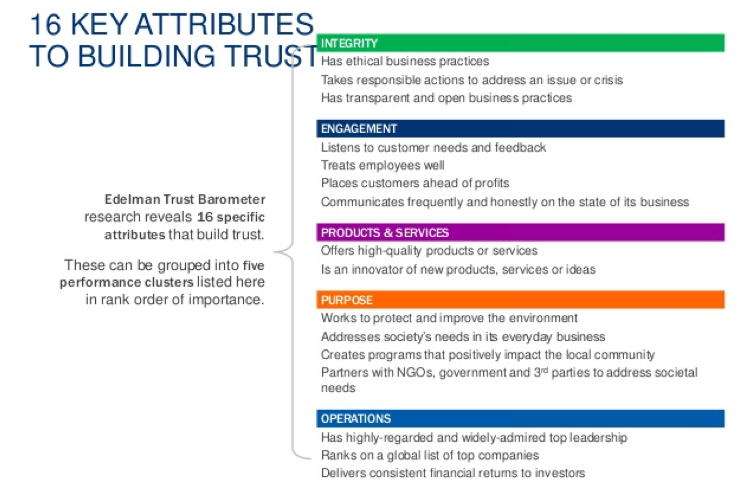in brands we trust - or don't we? How to build and keep brand trust in today's global world.18/1/2015
Every marketer and brand knows that a customer's trust is a real treasure and should be treated as a gold asset. A brand that enjoys high trust from its customers is also more likely to be rewarded with their loyalty, recommendations and personal information. As consumers, we trust our favourite brands as we trust a good friend, nurtured in a long-term relationship. Research shows that when people trust a brand, more than 80% will recommend it to other people. Signs of trusted brands are that they are perceived as leaders who delivers value, are genuine and transparent, surprise and excites their customers in addition to sharing an emotional relationship. Some brands that frequently ranks high on different lists for brand trust are Samsung, Apple, Amazon, BMW, Starbucks, Coca-Cola, Ritz-Carlton, Nivea, Sony, Toyota and IKEA.*  Edelman Trust Barometer Edelman has just released their “Trust Barometer” for 2015 where over 33,000 respondents in 27 countries have given their opinions about trust and credibility**. It is an interesting reading and I wanted to share with you some of the key insights: 2014 was the year of the unexpected and unimaginable events, leading to an evaporation of trust across all institutions – countries, governments, businesses and NGO’s are all affected in a negative way. Due to the Barometer, there are four factors that impact trust in business; industry sector, enterprise type, country of origin and leadership. Technology is the most trusted sector, but on a declining trend. The most trusted countries of origin are Sweden, Canada and Germany. When it comes to enterprises, family owned business are the most trusted in developed countries with a high premium vs. corporations. But in developing countries, big businesses are the most trusted. Finally, when it comes to leadership we favour academics and industry experts over CEO’s who are not seen as credible spokespersons. Think about every time you hear about a brand being in trouble and the CEO makes a statement, how often does it sound trustworthy to you? Trust in Innovation For the first time Edelman's Trust Barometer asked the public about their levels of trust in innovation. Trust is essential to innovation but their findings show that there is a new factor depressing trust; the rapid implementation due to new technologies that are changing everyday life. Respondents feel changes are going to fast and a majority says that greed& money are the real causes of innovation, not to make the world a better place or improve people’s lives. The greatest concerns are about genetically modified foods and fracking. Edelman has discovered a direct correlation between the trust level in a country and its willingness to accept new innovations. Innovation through data collection is on the rise but risks being demonized due to the invasion into our private lives. So how can brands overcome those trust issues? By being more transparent and demonstrate personal and societal benefits. The broader objective should be a better world. As Professor Klaus Schwab, founder of World Economic Forum wrote, “There are four prerequisites of the company’s survival; profitability, growth, risk protection and earning public trust.” Attributes that builds trust Trust is built through specific attributes where excellence in operations, products or/and services is more or less expected from consumers. Opportunities for improvement lie in performing integrity and engagement. This can include having ethical business principles, responsibility when addressing issues or crisis, placing customers and employees ahead of profit together with communicating in a transparent way. If your brand enjoys high trust, that's great. But you have to be mindful, as brand trust can quickly become eroded, especially with today’s power of internet. Here are some important questions to ask if you want to stay a trusted brand.
What is social media saying about my brand and what reviews do I get? What kind of media coverage do I receive, positive or negative? What retention rate do I have? If I loose customers, why are they leaving me? How do people react to new product launches? Do I get many customers based on recommendation from others? Am I perceived as a brand that gives value? There are no shortcuts to build trust. You have to do it stone by stone with a long-term perspective. And remember trust starts with respect, responsibility and transparency. Good luck. Sources: * sagefrog.com, dnaindia.com, entrepreneur.com, rdtrustedbrands.com, ** www.edelman.com/trust2015 Image: www.flickr.com/photos/dobs/10726756606ore  When thinking of what makes a great friend, trust and honesty often comes as top attributes. They are essential elements in any fruitful and long-lasting relationship with other people. A great brand is like a great friend, wherefore trust and honesty also are key ingredients in the build-up a strong and successful brand. A brand is built upon experiences and expectations in the mind of a person. The brand promise is the central point where a brand will make it or break it. Promises are easy to make but the essential thing is if the promise is kept. A good friend that doesn’t keep his promises will sooner or later be replaced by somebody else. The same goes with brands. To build trust, satisfaction and customer loyalty, a brand has to deliver upon its promises. A customer might forget you once for a broken promise or expectations that was not fulfilled, but rarely twice. The advice is simple. Under-Promise. Over-Deliver. By giving your customers a little bit more than they expect you will not only ensure them memorable experiences but they will also become loyal brand ambassadors that talks fondly about your brand. That will build invaluable trust and commitment. A company with high brand trust and customer loyalty is Starbucks. Starbucks use a motto of "Surprise and Delight" to win and retain its customers. This means both an unwavering commitment to a consistently great customer experience as well as giving customers free coffee on their birthdays, fun free applications or to offer a complimentary sandwich when the favourite one was finished. Small gestures that makes a customer feel special creates memorable moments and a trusted brand relationship. Lets take a look at some ways of how you can "Under-Promise and Over-Deliver" or "Surprise and Delight" customers. Or simply, how to WOW them! 1. Freebies. No need to go for the big things, simple gestures and small gifts also works well. The key that is should be unexpected. 2. A personal check-in. A personal email or call to a customer after the purchase, just to check that everything is ok. Or sending birthday cards to customers and congratulate them on their big day, a voucher can be added as well. 3. Rewards. Create a loyalty clubs with interesting rewards that encourage repurchase. 4. Bring a friend promotions. Design attractive 2-for-1 offers where customers can use your services or products together with their friends. 5. Events. Sponsor events where your customers can attend for free to see their favourite artists. 6. Compassionate service. Show sincere care and attention to customers and their issues, no matter how small it might seem. 7. 100% customer satisfaction. If a customer is not happy, make sure that your staff is empowered to do whatever they can to make them happy again, on the spot. 8. Handwritten Thank You note. A personalized and handwritten thank you note to customers after a purchase, an experience, a complaint or a visit to your store is a powerful tool to create brand trust. A customers brand trust is not created overnight but through many interactions with a brand over a longer period of time. Make sure your brand promise is always kept and that those interactions are filled with satisfaction, surprise and delight. You will then become a trusted brand, like a great friend. |
AuthorRosie Kropp, Categories
All
Archives
March 2015
|




 RSS Feed
RSS Feed